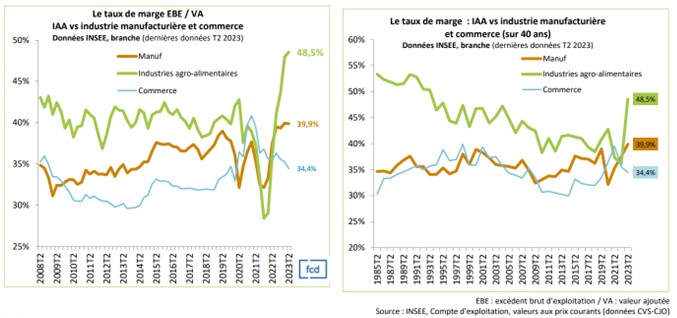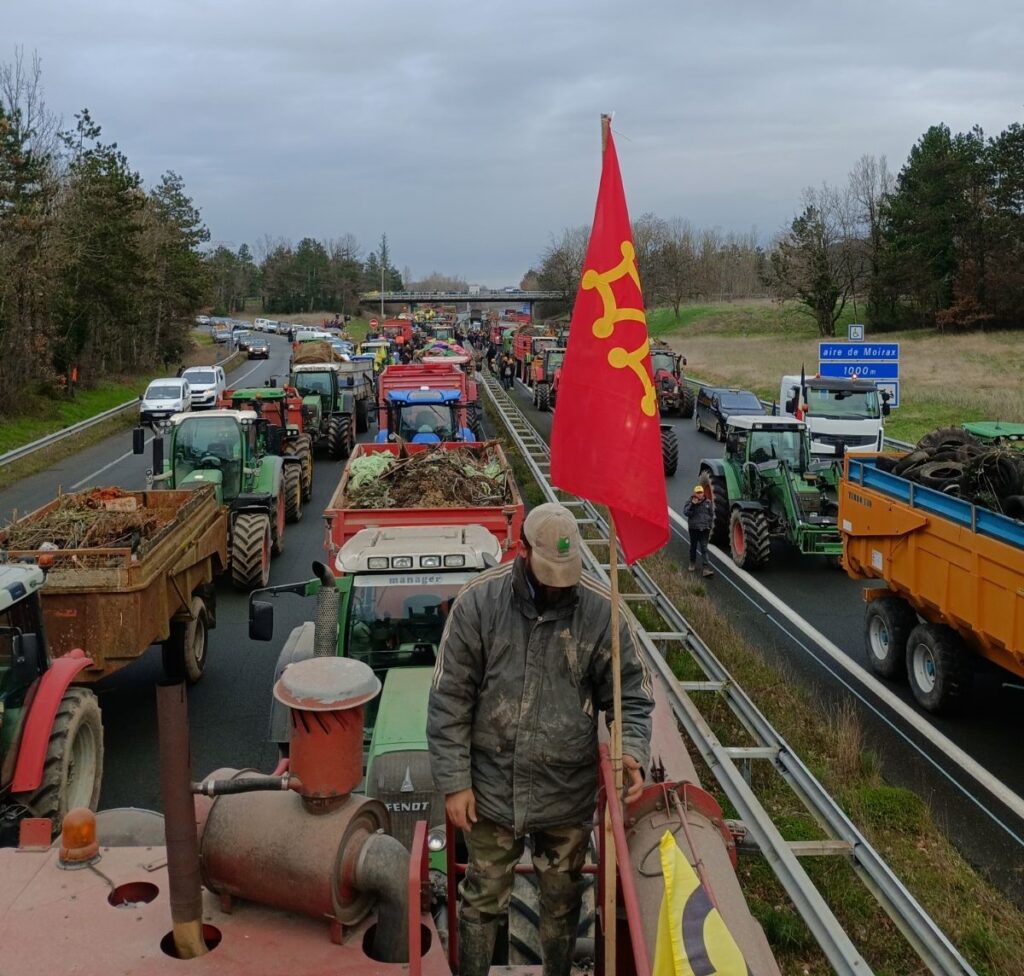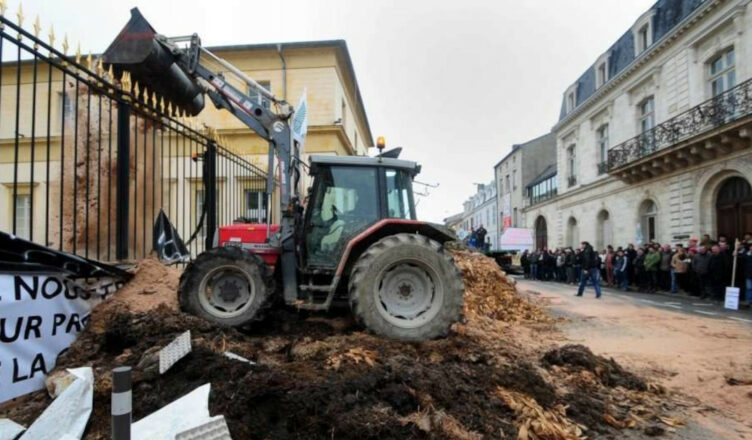By Chloé S. (Communist Party of France (PCF) – from Seine Maritime).
[This article has been taken from the French socialist website La Riposte and slightly edited for clarity for British readers. The original article can be read here]
*******
It took only a week for Prime Minister Gabriel Attal, after the fuse was lit of the highway blockade movement by farmers, to commit to rapid measures and to announce he was “putting agriculture above everything” in an attempt to extinguish the fire of their anger.
The introduction of emergency aid; the acceleration of EU Common Agricultural Policy (CAP) payments; the simplification of administrative controls; attempts to exert pressure on large retailers; the repeal of the appeal period for the implementation of certain projects (such as ‘megabasins’); the placing of the French Office for Biodiversity under the supervision of the Prefects; the simplification of procedures for cleaning of water pipelines; derogations on set-aside, opposition to the free trade agreement between the European Union and Mercosur… In short, “concrete and solid”…
The Attal government, unlike with other struggles, initially welcomed the farmers’ struggle with some benevolence, describing it as “healthy anger“. Despite the blockades, the roadblocks and the militant actions, the Minister of the Interior did not want to call in the police immediately, as an elected representative of a rural territory, accustomed to the “legitimate bloodshed of those who suffer, who do not earn much money and who work very hard“. According to him, “we don’t respond to suffering by sending the CRS.”
While the farmers’ anger is legitimate, it is clear that the government treats environmental activists, who fight to preserve resources and biodiversity, who are described as “terrorists”, differently from farmers, who are described as “patriots”.
With five months to go before the European elections and after the defeat of the Renaissance [Macron’s party] candidates in the rural areas during the last legislative elections, the government is adopting electoral measures to counter the rise of [Le Pen’s] National Rally. While in the short term these measures may lead to a slight improvement in farmers’ working conditions, they do not address the roots of the malaise in which farmers are mired.

(photo – wiki commons images)
They have partly responded to the demands of the FNSEA. This is the leading agricultural union [similar to the UK NFU], chaired by Arnaud Rousseau, businessman and boss of the powerful multinational Avril, with a turnover of €9 billion in 2022 and the fourth largest company in the agribusiness, behind Danone, Lactalis and Pernot Ricard. Arnaud Rousseau is trying to exploit the farmers’ anger in order to put pressure on the government and the European Union. He puts forward the slogan of “regaining the freedom of enterprise” by castigating inconsistent administrative burdens and environmental standards, which he believes are harmful to large agribusiness firms.
A movement with divergent demands
This multifaceted movement sometimes has divergent demands and different visions of the agricultural system, between those put forward by the FNSEA and the Young Farmers, on the one hand, and those demanded by the Confédération Paysanne [Peasants Confederation], on the other.
For the former, the obvious scapegoat for this malaise is largely Europe and its Green Deal, with its strategy to reduce pesticides and its “support” for biodiversity. For the Confédération Paysanne, however, it is a question of putting an end to free trade, which accentuates competition between farmers all over the world. On the other hand, there is one major demand that unites them, that of being able to live with dignity from one’s profession while having the guarantees of a fair income for all farmers.
The situation is a complex one. The profession is marked by sometimes very large differences in remuneration between farms, depending on the type of production and the marketing channel, according to the evolution of prices on the market and according to the size of the farms.
As a result many farmers struggle to generate sufficient income. According to the French National Institute of Statistics and Economic Studies (INSEE) more than one in seven farmers had zero or deficit incomes in 2021. For unprofitable farms, CAP payments alone do not allow them to live properly. While some farmers are struggling to make ends meet, others are much better off. Large farms account for 54.9% of farms in metropolitan France, Guadeloupe and Reunion. They receive 68.9 per cent of the subsidies and account for 75.7 per cent of gross production.
In particular, 2022 was a year of record profits for the largest farms. Gross operating surplus (EBITDA) [1] was 45.2% higher than the average of the last 20 years. Large farms increased their results by 53.5%. In a context of high energy inflation linked to the conflict in Ukraine and rising costs, and despite heat waves and drought that have weighed on some production, large farms have crushed small farms in the game of “free” market competition.
The big capitalist groups are gorging themselves on record profits
Beyond the differences in results and incomes between farmers, at each end of the chain, large industrial groups are making the most of competition in the agricultural market to generate record profits, and pay dividends to their wealthy shareholders. In 2023, the margin of companies in the agri-food industry was at its highest since 1991, with an unprecedented peak in growth as shown in the graphs below.

Source: Conjoncture: Food sector (France), Fédération du commerce et de la distribution, September 2023
Between the end of 2021 and the beginning of 2023, the profit-margin rate of the agri-food industries increased from 28% to 48%, an increase of 71% in 18 months. Between the first quarters of 2022 and 2023, gross profits in the food industry more than doubled from €3.1 billion to €7 billion. While some farmers from small farms are struggling to make ends meet and, faced with soaring food prices, nearly one in three people in France are struggling to afford three meals a day, for their part, the large capitalist groups of the agri-food industry are taking advantage of the situation to increase their profits and participate in a scandalous, or even possibly criminal way, to the increase in food inflation!
Multinational fertilizer companies are not to be outdone either. The global fertilizer market is controlled by an oligopoly of a few multinationals such as the Norwegian giant Yara, Nutrien (Canada) or Borealis (Austria). The largest fertilizer producers made record profits in 2021 and 2022. The world’s nine largest fertilizer manufacturers made about $84 billion in profits in 2021 and 2022, four times more than in 2020. G20 countries saw their imported fertilizer bills increase by 189% in 2021 and 288% in 2022 compared to 2020.
In France, apart from pig farmers, the vast majority of farmers are struggling to cope with the tripling of the price of their inputs. They have limited their price increases to remain competitive in the market, but at the expense of their incomes. The increase in the price of fertilizers could affect up to 20% of the world’s population, who may no longer be able to feed themselves.
In September 2022, the Executive Director of the World Food Programme (WFP) claimed that the consequences of the war in Ukraine had pushed 70 million people to the brink of famine, mainly due to rising fertilizer prices [2].
Farmers’ expenses also include the cost of seeds. Seeds are the primary production input used by farmers. Seed production activity saw a turnover of €3.6 billion for the period 2021-2022. It is French groups, agricultural cooperatives such as Limagrain or seed companies such as Florimond Desprez, that dominate the national market. For example, Limagrain Europe has increased its turnover by more than 60% in 10 years to reach €646 million in 2022 [3]. The seed sector is a strategic activity for France. As Europe’s leading producer and the world’s leading exporter, the French seed sector makes a major contribution to France’s agricultural influence, with a significant impact on the trade balance (+€1,109 million surplus) [4].
Socialist programme for farmers and for the environment!
The farmers’ malaise highlights the impasse of the capitalist system and its contradictions, with its competitive market pitting farmers against each other, forcing them to increase their yield and productivity. This situation leads to an overproduction of agricultural commodities that puts increasing pressure on resources. This way of producing does not make it possible to provide varied, qualitative and healthy food, nor to preserve resources and biodiversity, nor to ensure a remunerative price for farmers and accessible for consumers.

(photo wiki commons images)
Farmers and consumers find themselves trapped in this system at the mercy of capitalist profits. The problem of agriculture is the problem of capitalism, that is, the domination of a minority of capitalists grouped behind the agribusiness multinationals, and the competition between farmers for the benefit of large farms in a market governed by the laws of capitalism. There are experiments on other, more sustainable models of agriculture, but their large-scale development cannot be carried out on the basis of capitalist production.
The need to adapt agriculture to the challenges of climate change, the preservation of our ecosystem and the food security of all humanity means that we can no longer tolerate the subjugation of society to capitalist interests. The cause of the crisis in agriculture and the impoverishment of some farmers lies not in environmental standards, but in the ravages of capitalism.
So our task is to preserve our biodiversity, offer decent living conditions to the population and allow everyone to feed themselves. To meet this challenge, it will be necessary to:
- Expropriate the owners of large retail, agribusiness, agrochemical and petrochemical companies and nationalize the companies under the democratic control of the workers
- Nationalise the land of the largest farms and put it at the service of the needs of the population.
- Plan food production to:
- Put an end to competition between farmers and the agri-food sector. Regulate agricultural production according to real needs with a more sustainable mode of production.
- To ensure an income that allows all farmers to live properly and with dignity.
- Establish a system of international cooperation for research and experimentation with more sustainable and solidarity-based production methods.
- Setting up social security for food
Notes
[1]Gross operating surplus (EBITDA) is one of the interim operating balances. It corresponds to the operating income generated by the company during an accounting year. EBITDA indicates a company’s ability to generate cash resources based solely on its operations. Indeed, EBITDA does not take into account investments, financing, depreciation, etc.
[2]Source: Fossil Fuels on Our Plates, The Hidden Face of Fertilizers, Friends of the Earth.
[3]Source : Limagrain
[4]Source: French Union of Seed Producers



